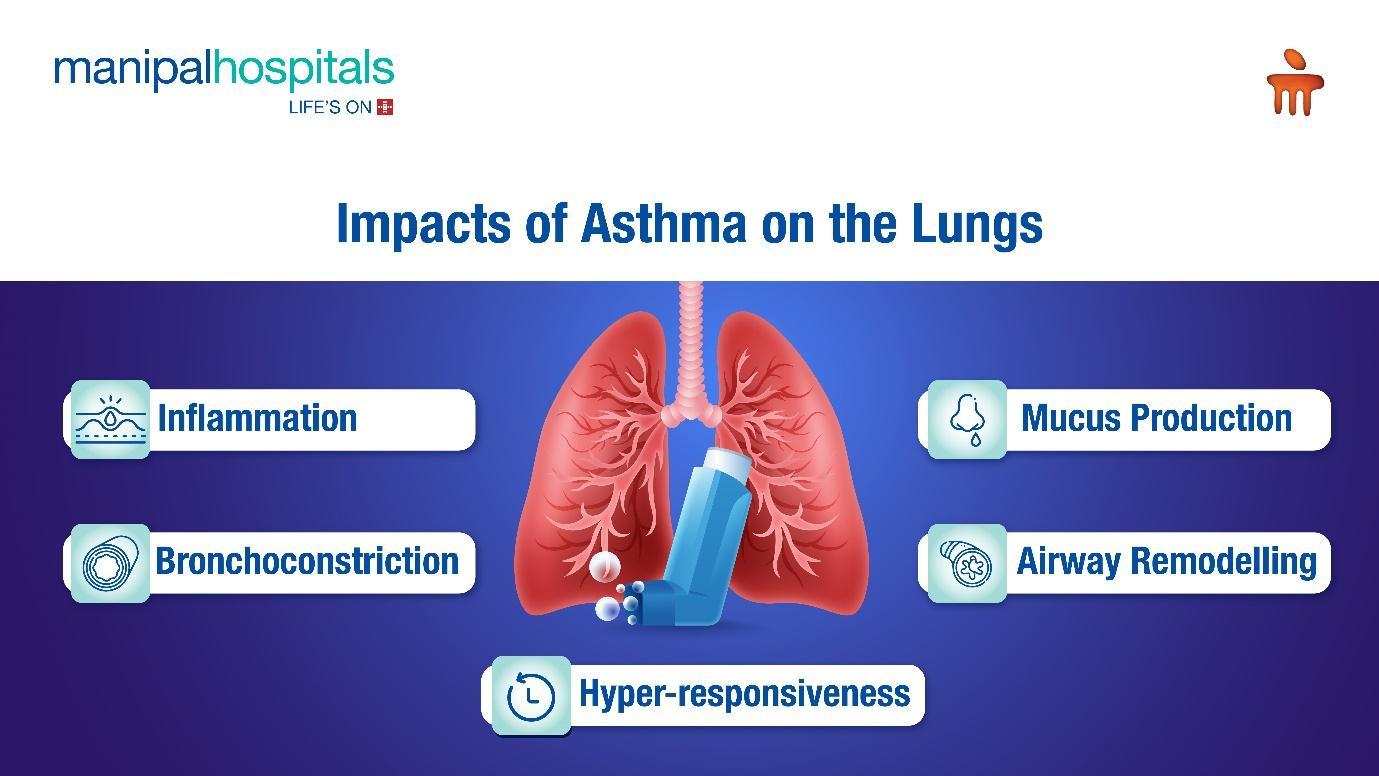
Asthma is an Obstructive Airway Disease that affects individuals of all ages and genders, leading to breathing difficulties and significantly impacting the quality of life for those affected. When asthma is triggered, it can make daily activities challenging and often requires careful management to keep symptoms under control. Understanding the causes, triggers, and overall impact of asthma is essential for effective management and improving the day-to-day lives of those living with this condition.
Synopsis
Overview of Asthma
Asthma is an Obstructive Airway Disease that affects the airways in the lungs that become inflamed and narrowed, leading to breathing difficulty. This inflammation causes symptoms like wheezing, coughing, chest tightness, and shortness of breath. Proper management can help people with asthma lead normal and active lives.
Types of Asthma
Asthma comes in various forms, each with its triggers and symptoms. Here are the main types:
1. Allergic Asthma: Asthma with cough, triggered by allergens like pollen, dust mites, and pet dander.
2. Non-Allergic Asthma: Triggered by factors like stress, exercise, and cold air.
3. Occupational Asthma: Caused by workplace irritants like chemicals, dust, and fumes.
4. Exercise-induced Asthma: Occurs during or after physical activity.
5. Childhood Asthma: Asthma that begins in childhood, is often linked to allergies.
What are the Causes of Asthma Disease?
The exact asthma disease causes remain unknown. However, researchers believe several factors contribute to its development. These factors include:
-
Genetics: Having a family history of asthma increases the risk of developing the condition.
-
Environmental Factors: Exposure to pollutants, allergens, and respiratory infections early in life can increase the risk of developing asthma.
-
Allergies: Many people with asthma have allergies. Some of the common allergens are pollen, mould, pet dander, and dust mites.
-
Respiratory Infections: Infections in infancy and early childhood can damage lung tissue and increase asthma risk.
-
Occupational Exposures: Exposure to certain chemicals or dust in the workplace can trigger asthma.
-
Lifestyle Factors: Obesity, smoking, and a sedentary lifestyle can increase the risk of asthma.

Impacts of Asthma on the Lungs
Asthma significantly affects the lungs and overall respiratory health. Here’s how:
-
Inflammation: Inflammation is the core issue in asthma. The airways become swollen and narrow, making it hard to breathe.
-
Bronchoconstriction: During an asthma attack, the muscles around the airways tighten, further narrowing them and causing difficulty in breathing.
-
Mucus Production: Asthma increases mucus production in the airways, which can clog them and make breathing even more challenging.
-
Airway Remodelling: Over time, chronic inflammation can lead to structural changes in the airways, known as airway remodelling. This can cause permanent narrowing and reduced lung function.
-
Hyper-responsiveness: The airways become overly sensitive to triggers like allergens, smoke, or cold air, leading to frequent asthma attacks.
When to See a Doctor?
If you experience any of the following symptoms of asthma disease, particularly at night or early morning, it is crucial to seek medical help:
- Frequent shortness of breath or wheezing
- Persistent cough
- Difficulty breathing after physical activity
- Symptoms that interfere with daily activities
- Frequent use of a quick-relief inhaler
In case of a severe asthma attack, seek emergency medical help if:
- Breathing becomes extremely difficult
- Lips or face turn blue
- If there’s no improvement use a quick-relief inhaler
Asthma is a manageable condition with an asthma pump with a spacer, but it requires understanding and proper care. Knowing the causes, types, and impacts of asthma can help those affected to control their symptoms better. Regular medical check-ups, avoiding triggers, and adhering to treatment plans can significantly improve the quality of life for people with asthma. Always consult with a healthcare provider to develop an effective asthma management plan tailored to your needs. For more information on asthma disease treatment, you can also refer to Manipal Hospitals, Vijayawada.
FAQ's
Shortness of breath, wheezing, chest tightness, and persistent coughing especially at night or early in the morning are some of the common symptoms of asthma.
Asthma is diagnosed through a combination of methods, such as:
-
Reviewing your medical history
-
Performing a physical examination
-
Conducting lung function tests- spirometry.
While there’s no cure for asthma, it can be effectively managed through medication and lifestyle changes. This allows most people with asthma to lead active and fulfilling lives.
Treatment options for asthma include quick-relief medications (like inhalers) to manage symptoms during an attack and long-term control medications (such as inhaled corticosteroids) to reduce inflammation and prevent symptoms.
Yes, asthma can run in families. One with a family history of asthma or other allergic conditions may be at a higher risk of developing asthma.





















 3 Min Read
3 Min Read

















